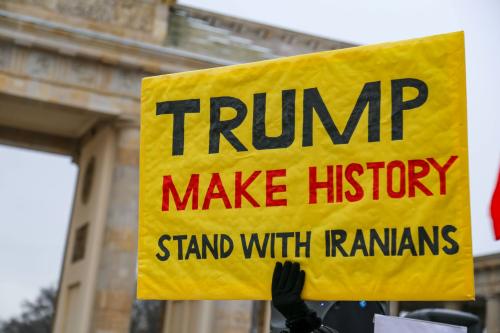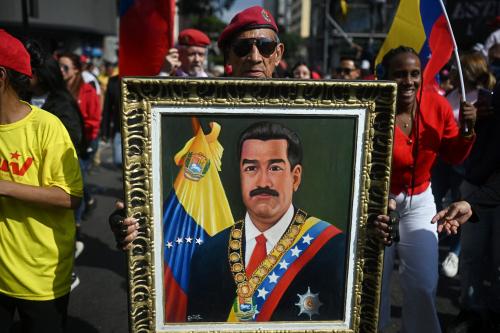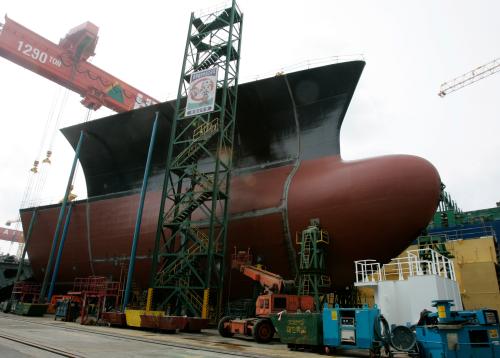The Washington foreign policy community—actually the entire Western world—is seized with how the U.S. and its allies should respond to Russia’s incursion into Ukraine. Before critical decisions are made, policymakers and pundits would do well to read Mr. Putin: Operative in the Kremlin. If you want to understand how Czar Putin views the world, how his view differs from our own, what motivates him, and how he responds, read this book. No one has dissected Putin better than my Brookings colleagues Fiona Hill and Clifford Gaddy.
Two years ago Hill and Gaddy published the first edition of the book. It analyzed Putin using a psychological profile that identified six distinct characters: Statist, History Man, Survivalist, Outside, Free Marketeer, and Case Officer. They described a one-man corporate state built on distrust and corruption that makes the inner circle of bureaucrats and oligarchs beholden to the one man at the center of the hub, and that prevents them from moving outside the system. It is the 21st century version of the small group of princes that ran tsarist Russia and the few comrades that governed the Soviet Union.
The second edition, published last month, adds a second part that uses this analysis of Putin to explain key actions he has taken since becoming President in 1999.
The book lays out an evolution in Putin’s view of America. As context, it is important to understand that he knows little about the West. His only experience outside of Russia was living in East Germany, and he has shown little curiosity or interest in knowing about the Western world. In his position in St. Petersberg, he evidenced a pragmatic view of the United States, working with American businesses to facilitate their entry into the region. That attitude evolved into viewing American behavior as destabilizing to Russia’s interests, to now evidencing outright hostility and believing that Russia is unable to work with America. He sees the United States as exercising unilateral and unchecked power which Russia must be able to counter.
One can understand how he might see the expansion of NATO into the Russian “near abroad” as threatening. What is harder for us is to fathom is his attitude toward western civil society. Most in the West see NGOs as the essence of a democracy and liberal society—citizen groups engaged in promoting public goods such as human rights, environmental protection, education, civic engagement. But for someone schooled in the lies, disinformation, dissimulation, and distrust of the KGB, and who sees the so-called color revolutions as destabilizing governments with which he could work, they are a different animal.
NGOs, indigenous and international, are viewed as fifth columns financed by western governments that are trying to undercut allied regimes and Putin’s authority. He views the presence of western NGOs as an invasion of Russian cultural and political space. Where the West sees democracy, Putin sees chaos and instability. NATO expansion, Ukrainanian integration into the EU, and international NGOs are all seen as modern versions of the historic outside threat to Russian security. Any individual and local organization working with these international NGOs is suspect and traitorous.
Hill and Gaddy trace Putin’s guiding objective—restoration of the Russian state and political stability—back to what they label his “Millennium Message,” a treatise he issued upon becoming acting president in 1999. They identify his watchwords as unity, cohesion, and consolidation. Putin allows open discussion while a decision is under consideration, or prior to an election (obviously, with severe limitations), but once a decision is made and an election is over, everyone is supposed to toe the line. There is a key disconnect between Putin and Western expectations: he is seeking a stronger Russia, not a Western-oriented Russia.
A goal of Putin in recent years has been to reduce Russia’s vulnerability to outside influence and shocks. He began by paying off Russia’s debt to the West and then moved to reduce its trade and investment vulnerability—diversification of trade, “de-offshoring” (pressuring oligarchs to bring assets home), and import substitution. But he has not moved to discourage foreign investment in Russia; instead he moved to structure investment deals so as to create a co-dependency. He sees the market place as a battlefield and readily uses economic leverage to pressure individuals and countries—e.g., against his own oligarchs and neighbors depended on Russian gas.
Putin has his own view of the world, manipulates history, and creates his own reality.
Hill and Gaddy warn us to neither underestimate nor overestimate Putin. He thinks strategically and will use any and all methods to achieve his ends. He is a fighter and survivalist who does not understand Western thinking or objectives. He is always seeking advantage over opponents. He is a pragmatist whose overarching goal is security. He bends facts and the truth and lives in his own world.
The Brookings Institution is committed to quality, independence, and impact.
We are supported by a diverse array of funders. In line with our values and policies, each Brookings publication represents the sole views of its author(s).



Commentary
Want to know what motivates Putin? Read Fiona Hill and Clifford Gaddy
February 19, 2015